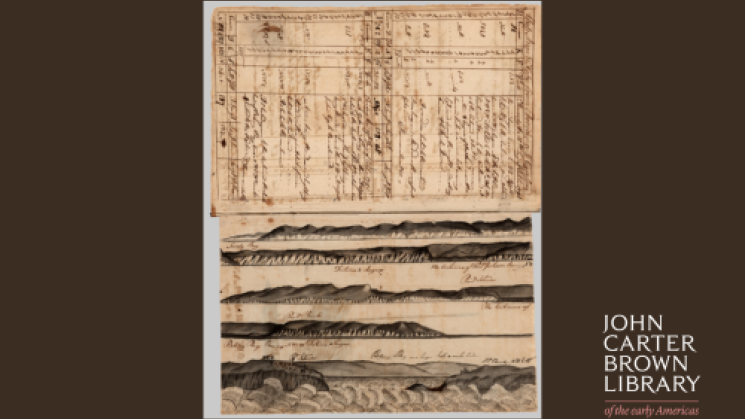The Brown Family Business Records at the JCB

While the JCB is known as a library of invaluable printed materials, it also holds important manuscript archives. Chief among our archival collections is the Brown Family Business Records (BFBR), which spans the 18th to the 20th centuries across 1345 boxes of files, letters, and ledgers. These rich records span the globe as well as the centuries. The papers have been at the JCB essentially from the outset of the library’s establishment as a research institution, and have informed profoundly significant scholarship, with the potential for much, much more; some of the earliest materials in the collection also rest at the heart of Brown University’s Slavery and Justice Report.
The organization and finding aids for the BFBR, however, have been a barrier to access, though several attempts have been made across many decades to provide both clearer order and insights into the collection contents. In the mid-twentieth century James B. Hedges, business historian and author of The Browns of Providence Plantations, attempted to calendar (or itemize) every piece of paper in the BFBR. It was a valiant effort, but he died before he could accomplish this goal. His work was translated into a card catalog system for the Papers, which is still accessible and browsable via our card catalog room.
In the late twentieth century an NEH-funded project was undertaken to fully process the papers according to each iteration of the Brown family business. The NEH project produced a standard file order, and a cross-referenced finding aid for each of the 8 businesses. Thus, if you were interested in, say, all of the voyages of a certain ship that was owned across generations of the Brown family endeavors, you could do that, but only by consulting several different finding aids. The finding aids were created in 1996, and are available in the JCB’s card catalog room or as a PDF –if you know to ask for them from the reading room staff.
To provide more nimble online access to this important collection, we are now collating the outputs of the NEH project–the folder level inventory and the associated metadata in each of the finding aids–into a single finding aid. This new tool will be organized according to the arrangement of the physical papers: correspondence, maritime and vessels (ships logs, inventories, insurance), and accounting records.
All 1345 boxes of papers–and their order-of-magnitude more folders–have now been entered into a database. The series level and folder level metadata for the correspondence series and the maritime records have been completed; we are working now on the accounting records. There are challenges and limitations to reformatting and collating those previously separated finding aids. Instead of one finding aid for each version of the Brown Family businesses, folders will be marked with their subject headings. If a folder contains correspondence pertinent to both Nicholas Brown & Co and to Brown, Benson, and Ives, for example, both subject headings will be listed. Other issues have been less easy to resolve, and we will work to iron them out as people begin using the finding aid and flag issues they encounter.
Because the JCB is a charter member of the statewide finding aid database Rhode Island Archives and Manuscripts Collections Online, (RIAMCO), RIAMCO is the best first stop for the completed BFBR finding aid. We intend to publish the complete finding aid on RIAMCO by June, with a corresponding online catalog record to follow. The finding aid project will have both immediate and long-term benefits for research. The digital directory removes barriers to access–users no longer have to be in the building to browse the collection, or know to ask a librarian for the finding aids.
Eventually, we envision a JCB-specific archives database where all the BFBR data is accessible and searchable, along with the other JCB archival collections. The BFBR do not exist in a vacuum at the JCB: they are one of several archival collections stewarded by the library. The Arnold Family papers and the Tillinghast papers, among others, are particularly salient as they also document colonial Rhode Island shipping and commerce. The Arnold papers were organized as part of a gift in the early 2000s from former JCB Board of Governors member Ira Unschuld. The Tillinghast papers, which were recently rehoused and described in RIAMCO by Brown graduate student MJ Cunniff, already have a finding aid available. Getting the Arnold Papers into RIAMCO will be our next major project after the BFBR. We are excited to offer this enhanced access to an important collection that speaks to so many questions and projects from scholars and the public alike.